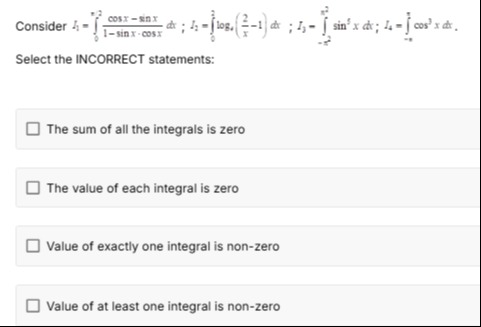Question
Question: Consider $I_1 = \int_0^{\frac{\pi}{2}}\frac{\cos x - \sin x}{1 - \sin x \cdot \cos x}dx$; $I_2 = \in...
Consider I1=∫02π1−sinx⋅cosxcosx−sinxdx; I2=∫02loge(x2−1)dx; I3=∫−2π2πsin5x dx; I4=∫−ππcos3x dx.
Select the INCORRECT statements:

The sum of all the integrals is zero
The value of each integral is zero
Value of exactly one integral is non-zero
Value of at least one integral is non-zero
Value of exactly one integral is non-zero, Value of at least one integral is non-zero
Solution
The problem requires us to evaluate four definite integrals and then determine which of the given statements are incorrect.
1. Evaluate I1=∫02π1−sinx⋅cosxcosx−sinxdx
We use the property ∫abf(x)dx=∫abf(a+b−x)dx. Here a=0,b=2π. So, a+b−x=2π−x. I1=∫02π1−sin(2π−x)⋅cos(2π−x)cos(2π−x)−sin(2π−x)dx I1=∫02π1−cosx⋅sinxsinx−cosxdx I1=−∫02π1−sinx⋅cosxcosx−sinxdx This means I1=−I1, which implies 2I1=0, so I1=0.
2. Evaluate I2=∫02loge(x2−1)dx
We use the property ∫0af(x)dx=∫0af(a−x)dx. Here a=2. I2=∫02loge(2−x2−1)dx I2=∫02loge(2−x2−(2−x))dx I2=∫02loge(2−xx)dx Now, add the original expression for I2 and this new form: 2I2=∫02[loge(x2−x)+loge(2−xx)]dx Using the logarithm property logA+logB=log(AB): 2I2=∫02loge(x2−x⋅2−xx)dx 2I2=∫02loge(1)dx 2I2=∫020dx=0 So, I2=0. (Note: This is an improper integral at x=0 and x=2, but it converges to 0.)
3. Evaluate I3=∫−2π2πsin5x dx
We check if the integrand f(x)=sin5x is an even or odd function. f(−x)=(sin(−x))5=(−sinx)5=−sin5x=−f(x). Since f(−x)=−f(x), f(x) is an odd function. For an odd function, ∫−aaf(x)dx=0. Therefore, I3=0.
4. Evaluate I4=∫−ππcos3x dx
We check if the integrand f(x)=cos3x is an even or odd function. f(−x)=(cos(−x))3=(cosx)3=cos3x=f(x). Since f(−x)=f(x), f(x) is an even function. For an even function, ∫−aaf(x)dx=2∫0af(x)dx. So, I4=2∫0πcos3x dx. We can rewrite cos3x as cos2x⋅cosx=(1−sin2x)cosx. Let u=sinx. Then du=cosxdx. When x=0, u=sin0=0. When x=π, u=sinπ=0. So, I4=2∫00(1−u2)du. Since the upper and lower limits of integration are the same, the integral is 0. Therefore, I4=0.
Summary of integral values: I1=0 I2=0 I3=0 I4=0
Evaluate the given statements:
-
The sum of all the integrals is zero: I1+I2+I3+I4=0+0+0+0=0. This statement is CORRECT.
-
The value of each integral is zero: As calculated, I1=0,I2=0,I3=0,I4=0. This statement is CORRECT.
-
Value of exactly one integral is non-zero: Since all integrals are zero, this statement is INCORRECT.
-
Value of at least one integral is non-zero: Since all integrals are zero, this statement is INCORRECT.
The question asks to select the INCORRECT statements.
The final answer is Value of exactly one integral is non-zero, Value of at least one integral is non-zero
Explanation of the solution: Each integral is evaluated using properties of definite integrals.
- I1: Using the property ∫0af(x)dx=∫0af(a−x)dx, the integral transforms into its negative, leading to I1=0.
- I2: Using the same property as I1, the integral transforms into ∫02loge(2−xx)dx. Adding this to the original I2 yields ∫02loge(1)dx=0, hence I2=0.
- I3: The integrand sin5x is an odd function, and the integration limits are symmetric about zero ([−2π,2π]). For an odd function f(x), ∫−aaf(x)dx=0. Thus, I3=0.
- I4: The integrand cos3x is an even function, and the integration limits are symmetric about zero ([−π,π]). For an even function f(x), ∫−aaf(x)dx=2∫0af(x)dx. Substituting u=sinx in 2∫0π(1−sin2x)cosxdx changes the limits of integration to 0 to 0, resulting in I4=0. Since all integrals I1,I2,I3,I4 are zero, the statements "The sum of all the integrals is zero" and "The value of each integral is zero" are correct. The statements "Value of exactly one integral is non-zero" and "Value of at least one integral is non-zero" are incorrect.
